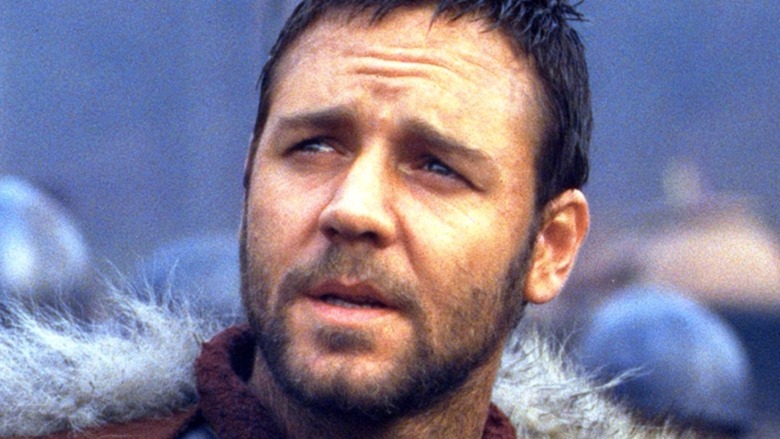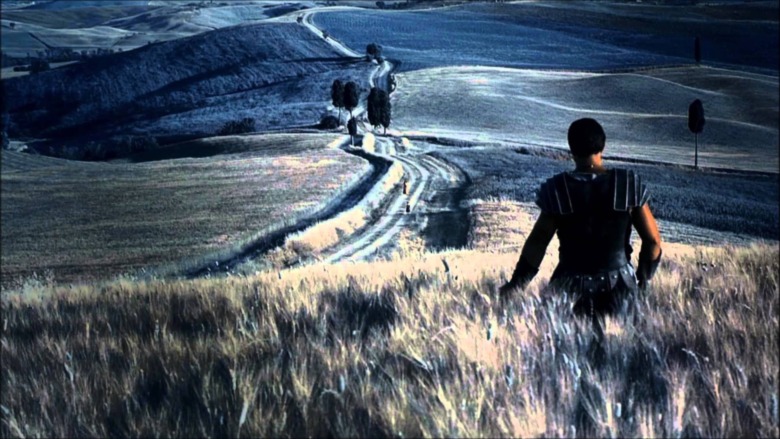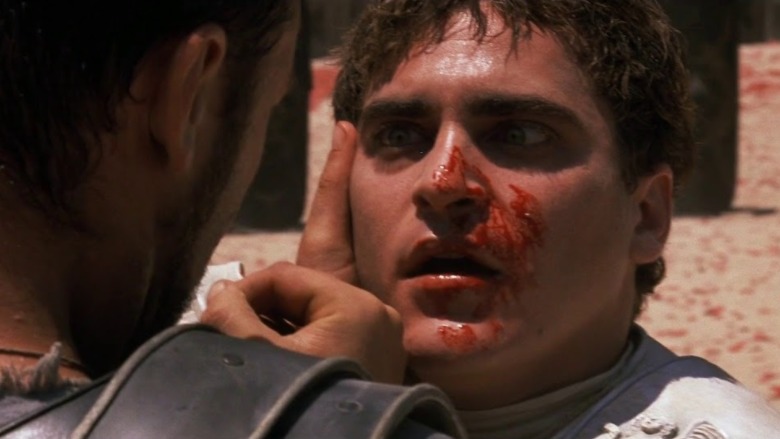The Ending Of Gladiator Explained
The most famous scene in "Gladiator" is the one that launched a thousand memes (to use a phrase from a different Ancient European society). Russell Crowe's Maximus asks the crowd "Are you not entertained?" after executing a double-sword beheading on an unfortunate opponent, delivering an iconic moment in movie and internet history.
But frankly, the rest of "Gladiator" also deserves a standing ovation from an arena full of bloodthirsty Roman citizens (and modern audiences), especially the ending. As promised in another well-known speech, Maximus does indeed have his revenge on father-/emperor-/wife-/child-killer Commodus (Joaquin Phoenix). But shortly after dispatching the megalomaniacal emperor, Maximus succumbs to his own injuries and dies in the blood and sand of the ring — although not without making sure his fellow gladiators are freed first.
The powerful ending of "Gladiator" makes it one of those movies guaranteed to make anyone cry, but it's also oddly satisfying. We'll explain.
Maximus achieves his noble goals at the end of Gladiator
It's fair to say the audience is pretty attached to Maximus by the end of "Gladiator." Watching him collapse and die after restoring his own freedom and ridding Rome of its Tyrant in Chief seems like, well, a downer. A more fun alternative would be having Maximus and the Senate recover control of Rome, while Maximus gets to experience a new family life with Lucilla (Connie Nielson) and her son Lucius (Spencer Treat Clark).
However, the ending, while sad, is true to Maximus's goals. He wanted to avenge the deaths of his wife and son, as well as clear the way for the Senate to restore order in Rome. Conveniently, both of these goals are achieved by killing Commodus. Once that's done, he only has one more goal: reunite with his family in the afterlife. The ending, however sad to viewers, allows him to do that. Indeed, director Ridley Scott's vision of Maximus slowly walking toward his family through the fields of their farm as he's dying is one of the most moving moments in movie history.
Interestingly, it took Scott a while to realize that, like a sadistic emperor at a gladiatorial display, the ending demanded Maximus's death. Crowe told Empire magazine in 2020 that originally, Maximus survived: Crowe said he used to joke that his character would "end up running a f****** pizzeria by the Colosseum." Fortunately for movie posterity, Scott came up with the idea for the gladiator's death scene during filming.
Unlike Commodus, Maximus isn't driven by a desire for power but by loyalty to "the true emperor" whom Commodus murdered — and to his family. Dying and going to Elysium is a more fitting reward for him than taking control of Rome.
The ending of Gladiator looks vaguely optimistic for Rome
Maximus is given a very clear ending, but what about the rest of Rome? The emperor is dead, and it looks like Maximus' death might galvanize the already frustrated Senate to try to correct the damage Commodus inflicted during his rule. But does this mean Lucius, who is only a child, will be the next emperor?
The movie doesn't answer this, and we never got to see "Gladiator 2." But since "Gladiator" is based on a true story (sort of), we can look at history to see what might have happened next. Be warned, though: If you thought Maximus's death was sad, you really won't like this.
The real Commodus was also a gladiator superfan, and he really did get in the arena and fight people. Unlike Maximus, they all let him win, letting him injure them to a non-fatal degree and then conceding, per LA Times. Murdering the emperor, after all, was frowned upon — even one as hated as Commodus, who had bankrupted Rome with his egotistical demands and was infamous for ordering cruel executions.
The real Commodus was also taken out by a Senate plot, although less publicly: After a few unsuccessful attempts, he was strangled to death in his bathroom by a professional wrestler moonlighting as an assassin. Unfortunately, the damage to Rome was already done. Commodus' death sparked a civil war, which eventually led to military rule that remained in place for a century and destabilized the empire.
The ending of "Gladiator" makes it seem like Commodus' death means a new beginning for Rome. But in reality, it was marked the end of the promise of Rome.


